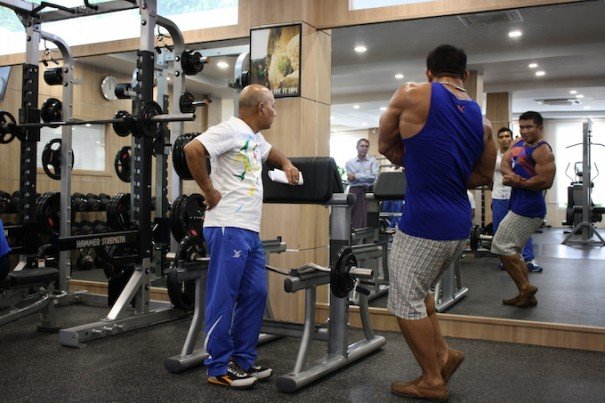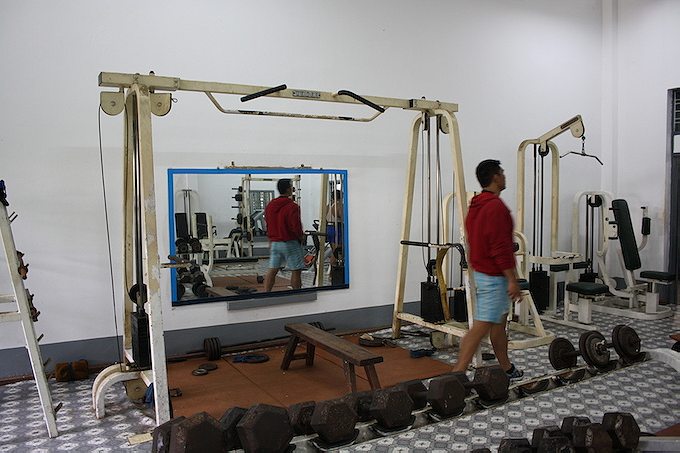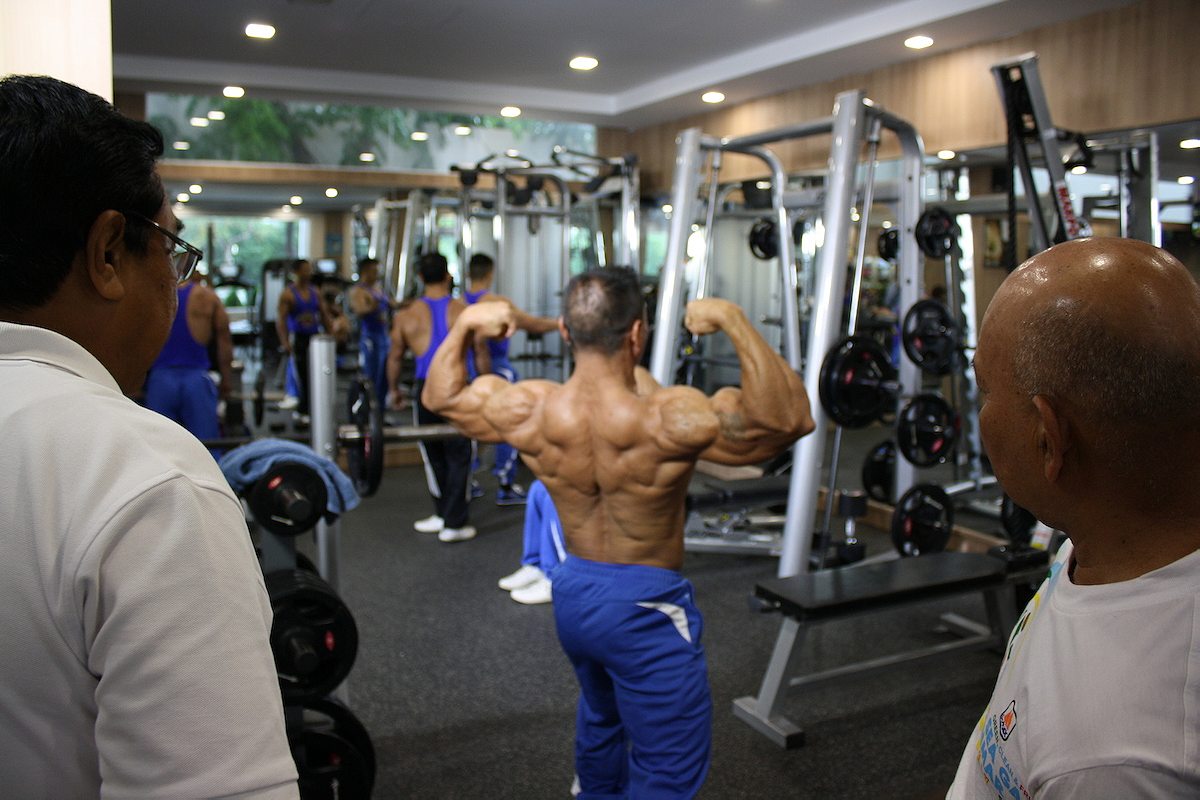
The Muscleman of Myanmar

Can a controversial bodybuilder finally win Burma the respect that it craves?
YANGON, Myanmar—
Atop the Myanmar Ministry of Sports website, alongside a slideshow featuring golden cartoon owls awkwardly Photoshopped onto blurry athletic fields, is a countdown ticker. It’s marking the minutes until the opening of the Southeast Asian (SEA) Games, an event you have probably never heard of. The SEA Games, held biennially among the 11 nations of Southeast Asia, are the region’s premier sporting contest. This year, for the first time since 1969, Burma is the host.
This year’s games, which begin Wednesday, have been hailed as Burma’s “coming out party,” and there is plenty to celebrate. After half a century of military rule marked by brutal repression, mass poverty, and near-complete isolation from the outside world, the last two years have brought sudden and remarkable change: free and fair elections, the release of political prisoners, and the near-total elimination of bruising international sanctions. While Burma (also known as Myanmar) still has many problems, including ongoing ethnic conflict in the country’s north, the transformation has been extraordinary—both in its speed and its scope.
For Burma, the SEA Games are not only a chance to prove that the country’s rapid reform and development are real; they are also an opportunity to recapture the respect the nation lost during its decades as an international pariah. In the arenas and stadiums that will house the tournament, Burma aims to showcase its newfound strength and ambition.
Fittingly, the country’s best chance to flex its muscle will be in bodybuilding, a national obsession and the country’s strongest event. If the SEA Games are to prove a triumph for Burma, it will be on the shoulders of the country’s bodybuilding team, and especially its brash, boyish bodybuilding champion, Aung Swe Naing. That is, if he can avoid getting kicked off the team first.

“I was very naughty,” Aung Swe Naing giggles, inspecting his short, spiked black hair in the locker room mirror. He flashes me a playful smile and sticks out his tongue. “I was drunk last night.”
When Aung is happy—which is nearly always—a mischievous grin spreads across his square face. At 5 feet 9 inches and 200 pounds, he is built like an ox, with the broad shoulders and muscled arms you would expect of a champion bodybuilder. But it is his smile that you notice most: Warm and unassuming, it creates the illusion that he is much younger than his 37 years.
In a country almost devoid of public figures—the ruling junta was reluctant to let any individual gain too much notoriety—Aung’s minor celebrity is unusually amplified. He is a three-time Mr. Myanmar, five-time Mr. Crusher (a nationwide fitness award), and a frequent medalist at regional bodybuilding competitions. He is also the odds-on favorite to take home gold at the SEA Games.
Despite his success, Aung’s attitude hasn’t endeared him to some officials. More seriously, rumors of illegal drug use have hounded him for years. His response to these allegations is unwavering. “No. Never,” he says. “Natural bodybuilding, to grow and learn, this is what I want.” He shakes his head as if to dismiss the issue entirely.
“What do you hope to accomplish as a bodybuilder?” I ask. Leaning forward suddenly, he swoops in close, eyes locked intently on mine. “I want a beautiful mind,” he whispers, slowly and deliberately, tapping a finger to his head. “And I want to share it with my country.”
Burma’s fascination with bodybuilding is as old as the country itself. In 1936, a 25-year-old Burmese weightlifter named Zaw Weik traveled to Berlin to compete in the XI Olympic Games. He was a symbol of Burmese strength, and despite his 15th place finish, his trip to the Olympics was hailed as a national triumph: a Burmese man competing alongside the world’s best.
But Zaw Weik’s trip to the Olympics was also a source of national shame—Burma, a minor jewel in the British colonial crown, was thought too unimportant to have its own Olympic team, so Zaw Weik was forced to compete for Team India. The lost glory of Burmese athletics, with Zaw Weik as its most potent symbol, is a frequent refrain in Burma and an elegy tinged with strong notes of nationalism.
“Long, long ago,” one government official tells me, “our teams were the best in Asia.” But then, he adds delicately, there was a “general crisis. Nobody can give time for sport because they are too busy finding food. They can’t play games.”
Under the military government, many Burmese sports teams simply didn’t compete internationally for decades, and those that did were a laughingstock, lacking the training, knowledge, and support necessary to be anything more than a speed bump for other national teams. To this day, Burma has never medaled in the Summer Olympics.
WHEN I SAW THE NATIONAL BODYBUILDING CHAMPIONS, I WAS SO IMPRESSED. I DECIDED I WANTED TO BE LIKE THEM
Despite the drought, hopes remain high for this year’s event. The Myanmar government understands the importance of soft power these days, and to maximize the PR boost of the SEA games, two things need to happen: The games must run smoothly, and Burma must dominate the medal count.
Host countries are allowed some discretion over the events, and Burma has openly tilted the playing field in its favor by omitting popular sports like tennis and water polo in favor of a motley assortment of traditional Burmese sports, such as vovinam (a local martial art) and sepak takraw (foot volleyball). Regional rivals have cried foul, but Myanmar is unrepentant. “We have chosen the sports in which Myanmar can get a lot of gold medals,” said U Khin Maung Lwin, the joint general secretary of Myanmar’s Olympic Committee.
The government has high expectations. At the 2011 SEA Games, Burma came in eighth out of 11 countries. Nonetheless, the Sports Ministry’s very public goal is to capture 100 of the 460 gold medals up for grabs at the games. In bodybuilding, which has five events, the ministry expects at least three gold medals.
Like many young men, Aung saw bodybuilding as a means to transform parts of himself he didn’t like. As a child, he says, “I was very skinny. My younger brother was bigger than me. I was shy and didn’t like to go out.” Bodybuilding, immensely popular since Zaw Weik’s Olympic appearance, offered a path to a different life: “When I saw the national bodybuilding champions, I was so impressed. I decided I wanted to be like them.”
Today, Aung is the only member of the seven-man national bodybuilding team that doesn’t train at the Yangon City Development Committee (YCDC) Sports Centre in downtown Yangon—opting instead to train independently at Real Fitness, a sleek modern gym stocked with new treadmills, flat-screen TVs, and uniformed attendants.

“Some people are jealous of me,” he says. “They ask: ‘Why does this guy stay outside the camp?’ But I wanted to be free with my nutrition, with training, not always eating the same thing every day or living with a bunch of other people.” As he sees it, there was no benefit to training with the team: “The coaches are just like our guards!” he exclaims. “They do not know how to train or prepare; they just follow the ministers.” His own country’s federation officials accuse him of drug use to cover up their own corruption and incompetence, Aung says.
Aung’s larger concerns aside, it’s easy to understand why he chooses to train at Real Fitness. The YCDC Sports Centre resembles less an international athletic facility than a summer camp that has run several years too long. Overgrown jungle presses up against the mold-covered wooden boards of the bodybuilding team bunkhouse. Inside, athletes and coaches sleep in a single room, each man allotted his own bunk.
The gym, a four-walled graveyard of rusted equipment, is hardly better. The air conditioning is either broken or nonexistent, and in the muggy afternoon heat, the weight stacks on the machines stick together, falling to the ground with a tremendous crash when an athlete jiggles them free. Every machine is pointed toward the same wall, on which is painted a simple message in all-capital letters: “BODYBUILDING IS NATION-BUILDING.”
After a few minutes, coach Kyaw Sein Than enters the gym. He walks toward me, delivering a swift kick to a street dog that has wandered inside. When I ask what time the athletes eat dinner, he huddles off to the side with one of the athletes, glancing back toward me suspiciously, and takes out his cellphone. He calls the secretary-general of the bodybuilding federation, then walks back over to me. “6:30 p.m.,” he reports.
Every question I ask about the SEA Games is met first with a call to the ministry or the bodybuilding federation, then with the same response: “Clean, green, and friendship,” which is the official motto of the 27th SEA Games. He checks my notes to see what I’m writing, then asks how long I will be staying.
Kyaw is more eager to talk when I ask about Aung Swe Naing. “He is a good, good, very good man,” he continues, clenching a fist for emphasis. “Since 10 years ago, he is best man in Myanmar.” Other players look up to him, Kyaw says, “and me also. We all try to be like him.” When I ask if Aung needed his permission to train independently, though, he becomes agitated. “No, no, no. He want to train freely, eat free, so he can’t stay in camp,” Kyaw replies, throwing his hands up in exasperation.
Hla thinks of himself as an artist, and he produces his official bodybuilding business card only reluctantly, after giving me his artist’s business card first. It is not simply that he prefers art to bodybuilding. In fact, he doesn’t like bodybuilding at all; like so many officials in Burma, he fell into the position because he was a senior army officer.
Hla is blunt about the depressing reality of national athletics in Burma. In contrast to the paltry means at his disposal, Hla says, the president of the Thai Bodybuilding Federation owns a string of high-end hotels. In December 2012, he recalls with a chuckle, he was invited to attend a dinner that the Thai official hosted in his own lavish hotel.
Even so, he is cautiously optimistic about Burma’s chances at the games. “We will get more gold medals than other countries,” he says—because the host country always wins. This is especially true in bodybuilding: “Nobody knows why you choose first prize—it depends on judges.” Hla says he has been dutifully wooing the judges in the run up to the games.
When I ask about Aung Swe Naing, Hla’s mood turns suddenly sour. “He tried to use drugs,” Hla blurts.
IF WE CAN’T GET ANY GOLDS WITHOUT DRUGS, OK. RESPECT IS MORE IMPORTANT
Hla claims that Aung is training outside the team compound because he was removed for using banned substances and out of fear that he would persuade other team members to do the same. “He has a better brain than other competitors. The others are uneducated; they listen to what Aung Swe Naing says. I say to him, ‘Don’t come to my camp.’ ” If Aung fails a single drug test before the games, Hla says, he will be off the team.
“If we can’t get any gold without drugs, OK,” Hla says. “Respect is most important.” He leans back in his chair and concludes, darkly, “Everybody knows he is using but he thinks they don’t. I know he will use.”
Downstairs at Real Fitness, Aung is arriving for his afternoon workout. I catch him just before he enters the locker room. He smiles and begins posing and flexing as if in competition, the smile never fading. “Remember,” he says, “be wise, be strong mentally.” He sticks out his tongue playfully, then continues, “I try hard to do different than all bodybuilders, than everyone else in Burma. That is why I succeed.”
